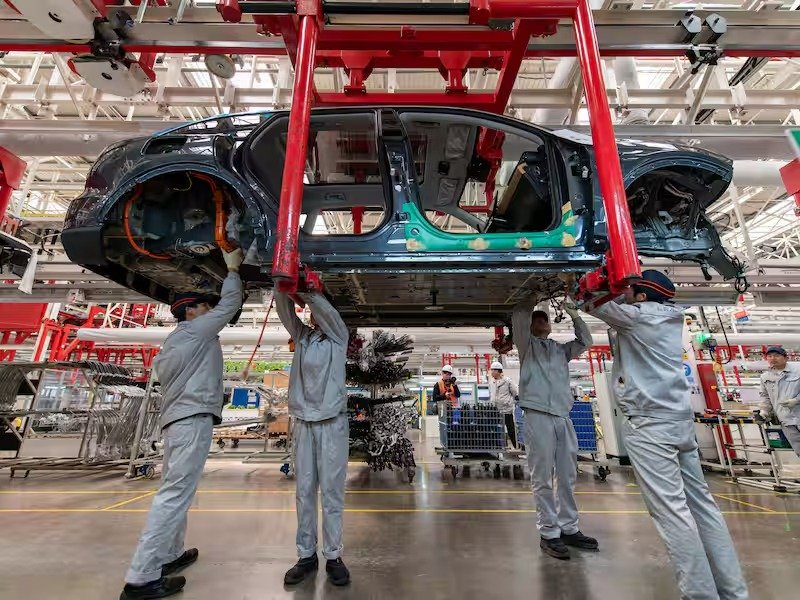How Tanzania Can Benefit from Low-Cost Electric Vehicle (EV) Manufacturing

With rich in mineral resources, skilled labour, growing energy capacity, and regional market access, the country can become a major EV manufacturing hub in Africa
The Government of Tanzania has long emphasized its commitment to transforming the country into an industrial economy. But is Tanzania ready to join the global race in Electric vehicle (EV) manufacturing?
As the world transitions from fossil-fueled vehicles to more sustainable options like electric and gas-powered cars, the demand for clean, quiet, and efficient vehicles continues to grow. EV manufacturing depends heavily on the availability of strategic minerals, clear and enforceable industrial policies, and significant investment capital. Fortunately, Tanzania possesses several key advantages that could position it as a competitive EV manufacturing hub in Africa.
1. Abundance of Strategic Raw Materials
Tanzania is richly endowed with a variety of minerals crucial for EV production. These include:
- Lithium: Essential for EV battery production. Found in Ngwala (Ruvuma), Ulanga (Morogoro), Dodoma, and Hanang’ (Manyara). Tanzania has confirmed lithium reserves and is attracting investor interest.
- Nickel: Used to make long-lasting EV batteries and stainless steel parts. Kabanga in Ngara (Kagera) hosts over 58 million tonnes of nickel, with a refining plant being built under the Kabanga Nickel Project in partnership with Lifezone Metals and the Tanzanian government.
- Cobalt: Supports battery and electric motor production. Found in Mpanda (Katavi), as well as Dodoma, Morogoro, and Tanga.
- Manganese: Used for EV batteries and structural components. Found in Dodoma, Mbeya, Songwe, Ruvuma, Lindi, and Tanga.
- Iron Ore: Critical for vehicle frame manufacturing. Found in Mchuchuma and Liganga (Njombe), with exploration ongoing in Uluguru Mountains and other parts of Mbeya and Tanga.
- Graphite: Needed for EV battery anodes. Tanzania has one of the world’s largest graphite reserves, especially in Ulanga (Morogoro).
- Copper: Used in EV wiring and circuits. Major copper deposits are in Katavi (Singililwa), Mbozi-Songwe, and Kinusi-Mpwapwa (Dodoma).
- Natural Rubber: For tire manufacturing and sealing parts. Grown in Morogoro, Kigoma, Ruvuma, Kagera, and Tanga regions.
These resources give Tanzania a rare strategic advantage for producing EVs at a lower cost compared to most African and international competitors.
2. Access to a Large Regional Market
Tanzania is a member of the East African Community (EAC), Southern African Development Community (SADC), and the African Continental Free Trade Area (AfCFTA). This gives local manufacturers access to a combined market of over 1.3 billion people. Unlike South Africa, whose vehicle production costs are higher, Tanzania can potentially offer new or affordable EVs at prices close to imported used vehicles from Japan, China, or Germany making them attractive to many Africans.
3. Skilled and Growing Human Capital
Tanzania now has a growing base of engineers, electricians, mechanics, and innovators ready to support an EV industry. A notable local example is Kaypee Motors by cartoonist and innovator Masoud Kipanya in Dar es Salaam, which has successfully produced prototype vehicles.
4. Reliable Energy Supply
Tanzania’s electricity generation reached 4,031.71 megawatts (MW) by May 2025, while current demand remains under 2,000 MW leaving a surplus for industrial use. Natural gas from Mtwara also powers several industries and can be used to supplement EV manufacturing plants. This reliable energy infrastructure is a strong foundation for EV production.
5. Availability of Industrial Land
Tanzania has ample land allocated for industrial zones and special economic areas, like Pwani Region ideal for hosting large-scale vehicle assembly plants. These spaces can accommodate machinery installation, testing tracks, and supply chain facilities.
Challenges Holding Tanzania Back
Despite these advantages, Tanzania has yet to establish an electric vehicle manufacturing industry. Several obstacles persist:
- Lack of Clear, Supportive Investment Policies
- The absence of comprehensive policies to promote EV production deters investors.
- Weak Policy Implementation and Follow Up
- Policies that exist are often poorly monitored or inconsistently implemented.
- Bureaucratic Bottlenecks and Corruption
- Lengthy, complex, and sometimes corrupt processes discourage industrial investors.
- Inconsistent Government Priorities
- Each new administration tends to shift focus, causing uncertainty and instability in long-term plans.
- Limited Incentives for Investors
- Tanzania lacks aggressive incentives like import restrictions on foreign-made vehicles, tax breaks, or subsidies for local EV manufacturers.
Way Forward
Tanzania stands at the threshold of an industrial breakthrough. With rich in mineral resources, skilled labour, growing energy capacity, and regional market access, the country can become a major EV manufacturing hub in Africa. However, this potential can only be realized with bold leadership, strategic policy reforms, investor incentives, and a streamlined bureaucracy.
Establishing an electric vehicle industry would:
- Create thousands of jobs
- Increase national income
- Reduce dependency on fuel imports
- Position Tanzania as a green tech leader in Africa
